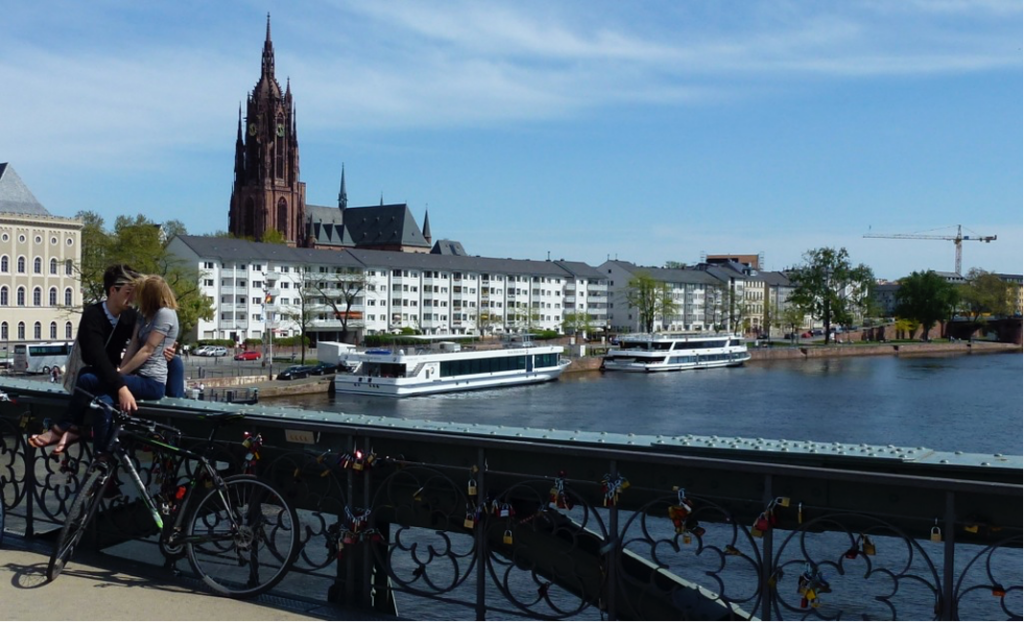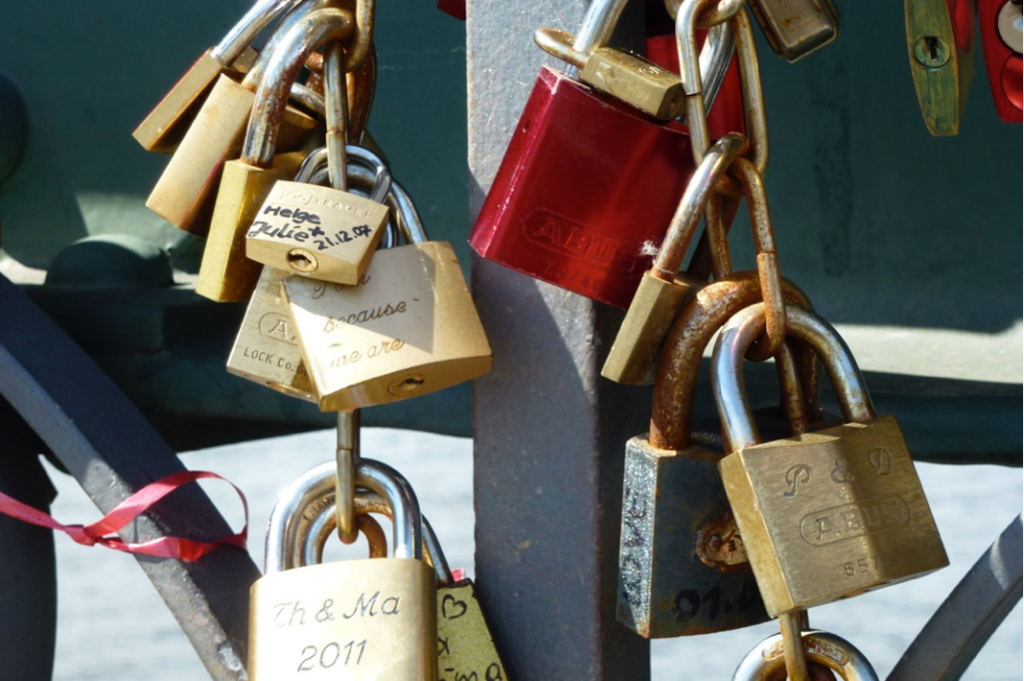On the river
(Poet's title: Auf dem Flusse)
Set by Schubert:
D 911/7
[February 1827]
Part of Winterreise, D 911
Der du so lustig rauschtest,
Du heller, wilder Fluss,
Wie still bist du geworden,
Giebst keinen Scheidegruß!
Mit harter, starrer Rinde
Hast du dich überdeckt,
Liegst kalt und unbeweglich
Im Sande ausgestreckt.
In deine Decke grab ich
Mit einem spitzen Stein
Den Namen meiner Liebsten
Und Stund und Tag hinein:
Den Tag des ersten Grußes,
Den Tag, an dem ich ging;
Um Nam und Zahlen windet
Sich ein zerbrochner Ring.
Mein Herz, in diesem Bache
Erkennst du nun dein Bild? –
Ob’s unter seiner Rinde
Wohl auch so reißend schwillt?
You who used to babble with such pleasure,
You bright, savage river,
How quiet you have become,
You have not even said ‘goodbye’.
With a solid, stiff crust
You have covered yourself,
You are lying cold and motionless
Stretched out in the sand.
On your surface I shall carve,
Using a sharp stone,
The name of my beloved
Along with the the date and time:
The day of our first greeting,
The day when I left,
Wound around the name and figures
Is a broken ring.
My heart, in this stream
Do you recognise an image of yourself?
Under its crust is there
A similar tumultuous swelling?
All translations into English that appear on this website, unless otherwise stated, are by Malcolm Wren. You are free to use them on condition that you acknowledge Malcolm Wren as the translator and schubertsong.uk as the source. Unless otherwise stated, the comments and essays that appear after the texts and translations are by Malcolm Wren and are © Copyright.
☙
Themes and images in this text:
Covers and covering Frost and ice Hearts Journeys Names Rings Rivers (Bach) Rivers (Fluß) Winter Writing
Rivers do not babble or roar ‘with pleasure’. They do not offer greetings or say ‘goodbye’ as they flow past. They are rivers.
However, the protagonist of Winterreise cannot see nature as inanimate or objective. Whatever he observes is mainly a way of understanding himself and the trauma that has made his own inner life both agonisingly painful and numbingly blank at the same time. It is HE who used to babble with pleasure in this landscape. It is HE who is now silent and cold. It is HE who failed to say ‘goodbye’.
We now have enough evidence that we can piece together to allow us to conclude that the character who is undertaking this journey uses writing to avoid personal encounters and uncomfortable conversations. In ‘Der Lindenbaum‘ he admitted that he used to carve lots of ‘loving words’ in the bark of a tree (almost certainly because he could not bring himself to utter them or confess his passion in speech). In ‘Gute Nacht‘ he left the house only when he knew that the other inhabitants would be asleep so that he could avoid an encounter; he simply wrote the words ‘good night’ on the gate or gate-post and substituted writing for conversation. Here, on the frozen river, he reverts to his comfort zone by carving graffiti which might never be seen by anyone else (and certainly which is not intended as real communication, just an outlet for his own inarticulate feelings).
Müller had already portrayed the inner life of a similar young man who had difficulties with social interaction and an inability to use speech effectively to interact with the world. Indeed there is much to be said for the idea that the traveller in Winterreise is living out an alternative ending to Die schöne Müllerin. This second miller / Müller is intimately connected with the river which drives the watermill and which in happier days had led him to his beloved. There is also an explicit link between a mill wheel and a broken ring (as in the graffiti on the ice in ‘Auf dem Flusse‘) in a poem by Eichendorff from 1813 that Müller must have known: Das zerbrochene Ringlein.
Das zerbrochene Ringlein
von Josef Karl Benedikt von Eichendorff
In einem kühlen Grunde
da geht ein Mühlenrad,
mein Liebchen ist verschwunden,
die dort gewohnet hat.
Sie hat mir Treue versprochen,
gab mir einen Ring dabei,
sie hat die Treue gebrochen,
das Ringlein sprang entzwei.
Ich möcht’ als Spielmann reisen
weit in die Welt hinaus,
und singen meine Weisen
und gehn von Haus zu Haus.
Ich möcht’ als Reiter fliegen
wohl in die blut’ge Schlacht,
um stille Feuer liegen
Im Feld bei dunkler Nacht.
Hör’ ich das Mühlrad gehen,
Ich weiß nicht, was ich will,
Ich möcht’ am liebsten sterben,
Dann wär’s auf einmal still.
The broken little ring
by Josef Karl Benedikt von Eichendorff
In a cool valley
there is a mill wheel turning,
my beloved has disappeared
who used to live there.
She swore she would be faithful to me,
gave me a ring as well,
she broke her promise,
the little ring split apart.
I want to travel as a busker
far away across the world,
and sing my tunes
and go from house to house.
I want to fly off on horseback
and even go into bloody battles,
and lie around quiet fires
in the open air on dark nights.
When I hear the mill wheel turning
I do not know what I want to do,
I would most like to die,
Then everything would be quiet for once.
Whether or not Müller was deliberately making reference to Eichendorff’s poem in Winterreise (with the desire to escape, the need to find silence, the prospect of being a busker etc.) there can be no doubt that he was drawing on a generally agreed understanding of the symbolism of a broken ring. Just as the eternity of the ring symbolises fidelity and commitment, a broken ring is an image of broken promises and shattered expectations. It is the opposite of that other symbol that is becoming increasingly common by rivers around the world: the padlock engraved with the names of the lovers (along with significant dates), whose missing key (thrown into the water) affirms the firmness of the union.


[Photos: Malcolm Wren]
☙
Original Spelling Auf dem Flusse Der du so lustig rauschtest, Du heller, wilder Fluß, Wie still bist du geworden, Giebst keinen Scheidegruß. Mit harter, starrer Rinde Hast du dich überdeckt, Liegst kalt und unbeweglich Im Sande ausgestreckt. In deine Decke grab' ich Mit einem spitzen Stein Den Namen meiner Liebsten Und Stund' und Tag hinein: Den Tag des ersten Grußes, Den Tag, an dem ich ging, Um Nam' und Zahlen windet Sich ein zerbrochner Ring. Mein Herz, in diesem Bache Erkennst du nun dein Bild? Ob's unter seiner Rinde Wohl auch so reißend schwillt?
Confirmed by Peter Rastl with Gedichte aus den hinterlassenen Papieren eines reisenden Waldhornisten. Herausgegeben von Wilhelm Müller. Zweites Bändchen. Deßau 1824. Bei Christian Georg Ackermann, pages 87-88; and with Urania. Taschenbuch auf das Jahr 1823. Neue Folge, fünfter Jahrgang. Leipzig: F. A. Brockhaus. 1823, page 217.
First published in Urania (see above) as no. 7 of Wanderlieder von Wilhelm Müller. Die Winterreise. In 12 Liedern.
To see an early edition of the text, go to page 217 Erstes Bild 255 here: https://download.digitale-sammlungen.de/BOOKS/download.pl?id=bsb10312443


